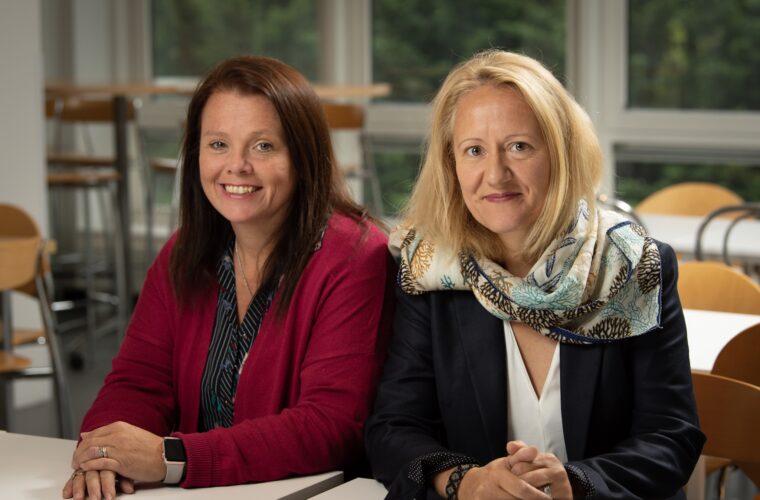Michelle Dervan: meet the founder looking to plug skills gaps for firms globally
Michelle Dervan: Skills shortages remain the crux of the hiring process for managers. With salaries accounting for such a large proportion of corporations’ spending, technology innovations are being welcomed with open arms.
A recent survey from UK recruitment firm Robert Half shows 40 per cent of the workforce are planning on changing jobs this year. In addition, research from Employment group Manpower shows that four out of five UK businesses struggle to fill vacancies because of a lack of skilled workers. Making a bad hire can not only cost companies but also create turbulence in a time where tech talent stability is crucial across specific sectors, incredibly tech.
With this in mind, we spoke to the female founder and CEO of SkillsTrust, Michelle Dervan. SkillsTrust is a verification platform that aims to transform the recruitment process for companies. We began by asking her about skills matching performance, AI-assisted work sample testing and the challenges she has faced as a female founder.
Firstly, Michelle, can you tell us where the concept for SkillsTrust emerged from?
SkillsTrust was born from my observation that the traditional recruitment process relies too much on interviews, which can often be a poor predictor of future performance. This means employers can fall victim to hiring people who interview well but don’t necessarily perform as strongly on the job. It also often means that skilled candidates can get overlooked because they do not have a way to demonstrate their skills for the job. I carried out discussions with numerous hiring and HR managers and I discovered a real need for something that could assess skills through practical and relevant work samples rather than multiple-choice questions.
I later looked into work sample testing and found that decades of research support it as among the most predictive and fair ways to assess candidates for jobs. The issue was, however, that the operational overhead involved in designing work sample tests, administering them to candidates and grading the submissions was too time-intensive for most hiring managers to take on. It was this that led me to start SkillsTrust.
What did you do before establishing the company?
Before founding the company, I was deeply involved in the education technology and venture capital sectors. I was a partner on the investment team at a US VC firm called ‘Rethink Education’, which focuses on early-stage investments in education technology companies. My role involved identifying promising startups and negotiating investments, supporting founding teams and contributing to the innovation and growth of the edtech ecosystem.
Did you find you had many transferable skills that you could use to help build SkillsTrust?
Well, I had just turned 40, so I have built up almost 20 years of work experience! I would say that my career to date has certainly given me a good foundation across the three key areas for a startup CEO, from fundraising to hiring and selling. Fundraising is a particular area of expertise as I ran a seed fund in the past, and therefore, I understand the importance of certain terms and the potential pitfalls. That is not to say that I have everything figured out! The learning curve when starting a company is incredibly steep. I am constantly in situations where I’m doing things for the first time and have to figure them out. I think that the need to constantly learn new things is probably what I love most about startups!
Can you tell me a bit about the challenges you faced in trying to develop the platform?
From a product design perspective, the challenge of creating high-quality, highly relevant job-specific work sample tests and grading them in a standardized format and at scale is a non-trivial exercise! Doing something new comes with lots of hard design challenges and questions. We consulted with specialist assessment experts on our test model and development processes. We are also very fortunate to have an excellent team in terms of technical and assessment expertise, as well as a great group of advisors.
What sets the platform apart from similar recruitment tech platforms?
Well, I think it’s important to mention that we don’t see ourselves as a recruitment tech platform but rather a skills verification service. There are already a lot of companies that automate recruitment workflows for companies. SkillsTrust sets itself apart by focusing on high-fidelity skill verification through AI-assisted work sample testing. This helps hiring managers to identify better candidates who can perform from day one.

In your opinion, what are the main challenges currently facing recruitment, particularly in the tech sector?
I think the main challenge today is that AI is rapidly being adopted by job seekers to generate resumes and cover letters and even to provide assistance with answers in video interviews! This trend makes it more difficult to tell if a person can do what they can and then attempts to increase the hiring mistake rate. With the cost of a bad hire ranging from tens of thousands to one and a half, if not two times the annual salary, the urgency to enhance hiring accuracy is evident. SkillsTrust aims to reduce the likelihood of regrettable hiring decisions by providing a clear and objective assessment of job-specific skills.
How did you go about attracting investment into SkillsTrust?
I raised a €1m round of pre-seed financing last year from VC firms in London and New York and two industry angel investors in Ireland. In preparation, I followed Steve Blank’s Lean Startup approach. This involved carrying out customer discovery interviews with dozens of hiring and HR managers to understand skills assessment today and uncover any friction points. I highly recommend a book called The Mom Test by Rob Fitzpatrick, which has great actionable advice on running this research. From there, I took what I learned and secured a local government grant to develop a prototype using a low platform. Armed with this research, I approached a small group of investors who were interested in pre-seed stage companies, and with an investment thesis, I then focused on workforce development.
What has the feedback been like from hiring companies so far?
I am glad to say that feedback has been overwhelmingly positive. Hiring companies appreciate the massive time savings associated with automating job-specific skills tests’ creation, delivery, and grading. They also like the depth of insight our platform provides into candidates and their actual skills and abilities. The hiring managers we continue collaborating with believe that the work sample provides significantly more insights into the candidate going for a job than an interview alone.
Are you planning on adding any new features to the platform?
Yes, but I can’t reveal all of them at this point in time! We are constantly exploring new features and enhancements to serve users better. This includes expanded work sample libraries to cover more roles and integrations with HR systems for streamlined workflows.
What advice would you give to other female founders looking to start their own tech business?
I think that if you’re feeling a strong pull to start something, chances are that it’s not going away. Yes, startups are a rollercoaster; they involve high risk and a ton of work, but they’re also incredibly rewarding! Although I don’t have everything figured out, I think having the right people around you is really important. You need to ensure you are attuned to your own strengths and weaknesses and that you find co-founders and early employees who bring complementary skills to the table and excel in the areas where you don’t. In the early days, a strong group of advisors can accelerate the founding team’s work. Other founders are also an excellent source of advice and ‘unlocks.’ By this, I mean spending some time in a co-working space or a startup hub such as Dogpatch Labs in Dublin is helpful.
And finally, what are your ambitions for SkillsTrust over the next 18 months?
We’re on a mission to reshape how job skills are assessed and recognized, making it fairer and more relevant for everyone involved. Over the next eighteen months, our ambition is to expand our impact significantly. We plan on increasing the number of companies and candidates we serve and the range of roles covered by our platform. We aim to establish SkillsTrust as the go-to solution for skill-based hiring; as well as, we hope to continue innovating to make the recruitment process more effective and equitable for all involved.



